Eat, Drink, Move NHS Campaign
4 minute read | 15/09/2022
.png)
Whenever people are ill or unwell, the immediate reaction is for them to get lots of rest and just sleep it off. Right? Well not quite. If you don't keep active, don't eat enough and don't have enough fluids, you risk your health declining which keeps you in hospital for longer. That’s why the NHS have launched a campaign to encourage patients to Eat, Drink and Move.
While these elements are easy to do when you're healthy, being in hospital makes these simple tasks that little bit harder. Read the different sections below to find advice, tips and tricks to Eat, Drink and Move to help speed up your recovery,
Eat: Keep Yourself Nourished
I know it may sound obvious, but you need to eat while staying in hospital. No matter what your diet or cultural needs are, the hospital nurses will be able to provide you with something that you can eat.
Make sure to speak up and make your needs known. They are there to look after you after all. A healthy diet means your body is equipped with the right nutrients to help fight off your illness. The sooner you fight it off, the sooner you can go home!
“But I don’t have an appetite”...
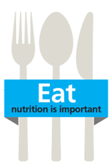
Even if you don’t feel like eating, it's good to get something down. Even if solids are difficult for you, there’s always soup, a milky drink, or even a pudding. You also don’t have to eat one full meal in one go. Eating little and often will also help to give your body the energy to get better faster.
You can even ask visitors to bring you your favourite snacks that you can keep safe from other greedy hands in your bedside locker. Items that are good to bring include: Dry fruit, individual cartons of juice (that don’t need to be kept in the fridge), biscuits, and individually wrapped sweets and chocolate. Follow the guidance of your healthcare professional.
Convenient meal ordering
Your TV Bedside Unit may have our Electronic Meal Ordering (EMO) available. This system makes it easy to browse through the various food options and choose the meal that you will enjoy. It’s like online shopping but for your stomach. In some hospitals, meals may be ordered electronically.
A lack of water makes you feel thirsty, drowsy, confused, and can cause headaches. It makes sense when you think that your body is made of 60% of water. Little sips often but frequently will keep your body hydrated and help prevent you from feeling worse. Make it a target to drink 10 cups of fluid a day. This means you can still drink tea, coffee, milk, soft drinks, and water. Ward staff are there to assist. Use the nurse call button on your bed if you need any assistance.
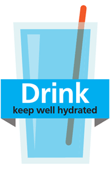
Move: Stay Active
While ward staff are there to assist and bring things to you, it doesn’t mean that you should be glued to your bed.
A) Because the ward staff will have other patients to attend to.
B) It’s in your own self-interest. If you don’t move enough then there’s an increased risk of blood clots, pneumonia, pressure sores, falls, etc. This is easily avoidable by incorporating some basic daily movements into your hospital routine.
“But how can I be active in a hospital?”...
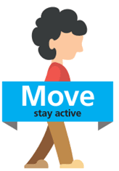
There are many ways in which you can stay active. Even if it's something simple such as:
• Getting up and changed into your own clothes.
• Walking around the ward when safe to do so.
• Walking to the food trolley to choose your meals.
• Walking with your visitors when they come to see you.
• Asking for walking aids if required or asking the ward staff to help you.
You can also stand up to watch TV and do a few stretches while you do so. This is if you’re in a hospital with TV Bedside Units because they have moveable arms. Find out what these TV Bedside Units are.
Remember to
Eat
Drink
Move
To help you feel better in hospital
All information within this blog post was sourced from the NHS Eat, Drink, Move campaign.
About the author
Rebecca O'Donovan
Becky is the Marketing Director at SPARK TSL, of whom she has worked for since 2012. She is responsible for high-level marketing strategy focusing on lead generation and aiding the vision of the business to ensure business growth.
More articles by the author
Related articles
%20(1).png?width=386&height=180&name=Free%20WiFi%20(1)%20(1).png) Healthcare Industry
Healthcare Industry
NHS Improvements and Innovation Ideas for Digital Inclusion
Digital Inclusion concerns the needs of all users. Every visitor and patient that passes through your ...
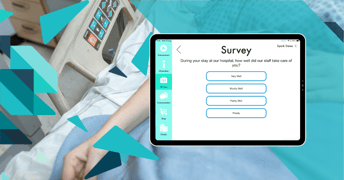 Patient Experience
Patient Experience
How SPARK Fusion Surveys Help NHS Teams Listen & Improve
Welcome to Matchmaking March! Each week, we tackle a different NHS challenge and pair it with a feature from ...
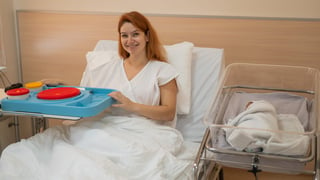 Patient Experience
Patient Experience
The Perfect Match for NHS Meal Management
This March, we’re launching Matchmaking March, where each week we highlight a key challenge faced by NHS ...


